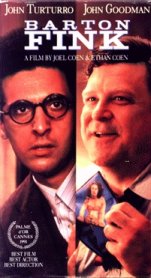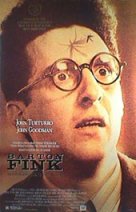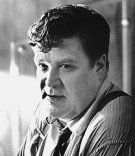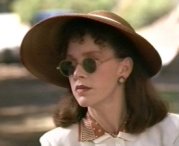|
Barton Fink
|
| |
 |
USA, 1991.
Rated R. 116 minutes.
Cast: John Turturro, John Goodman,
Judy Davis, Michael Lerner, John Mahoney, Tony Shalhoub, Jon Polito,
Steve Buscemi
Writers: Joel & Ethan Coen
Music: Carter Burwell
Cinematographer: Roger Deakins
Producers: Ethan Coen & Graham Place
Director: Joel Coen
|
| Grade: A |
Analysis
by Jeff Vorndam |
Note: This analysis contains spoilers.
 don't
know if I've ever seen a movie that suggests or hints at so many interpretations.
Some people may regard this as weakness, that the Coen Brothers tantalize but
ultimately fail to deliver. I see it as a perfect way for everyone to take away
his or her own reaction from the film. Is Barton Fink a satire of Hollywood
in the 40s? An autobiographical essay on writer's block and life imitating art?
An homage to Roman Polanski? An allegory of American seduction with fascism
or Nazism? A graphic depiction of the dangers of living within one's head? It
is all of these, and it is none of these. It is quintessentially a Coen Brothers
movie though.
don't
know if I've ever seen a movie that suggests or hints at so many interpretations.
Some people may regard this as weakness, that the Coen Brothers tantalize but
ultimately fail to deliver. I see it as a perfect way for everyone to take away
his or her own reaction from the film. Is Barton Fink a satire of Hollywood
in the 40s? An autobiographical essay on writer's block and life imitating art?
An homage to Roman Polanski? An allegory of American seduction with fascism
or Nazism? A graphic depiction of the dangers of living within one's head? It
is all of these, and it is none of these. It is quintessentially a Coen Brothers
movie though.
Before I get into exploring the possible themes I've listed, I want
to make some general comments about the movie. I love how each character
has a different manner of speaking. It's like Hollywood in the 40s is the
equivalent of ancient Babel and the films are its tower. Barton speaks
in art-critic cliches. He uses words like "squalor" and phrases like "empty
formalism" while trying to explain his work (which actually sounds like
my job). He talks like he's constipated--and he is...mentally. Charlie
Meadows expresses himself much more simply and "from the gut" though that's
where Barton aspires to write from. Charlie uses words like "damn" and
"hell" often, maybe a little too often. He's a born storyteller, a folksy
down-to-earth guy. As the head of the studio, Jack Lipnick, Michael Lerner
is hilariously impatient, equivocal, egomaniacal, and insincerely obsequious.
He speaks incredibly rapidly, because he is an Important Man, and his mind
wanders audibly like he has no control over refraining from speaking his
thoughts as they come to him. For example:
We're only interested in one
thing, Bart. Can you tell a story? Can you make us laugh? Can you make us
cry? Can you make us want to break out in joyous song? Is that more than one
thing? Okay!
Geisler barks in an angry staccato. Deutsch and Mastrionotti zing deadpan
threats and observations like bullets. Mayhew's drunken drawl is incongruous
with his poetic words. Audrey insinuates something with every mid-preposition
halt that belies her Southern wholesomeness. It's fun just to listen to
these actors speak their lines, and a bonus that it's not just nonsense.
One of the theories about Barton Fink that almost seems out of left
field is that the film may be an allegory for liberal pussyfooting during the
rise of Nazism in the 1930s. Roger Ebert, in his review, writes:
Goodman, as the ordinary
man in the next room, is revealed to have inhuman secrets, and the movie leads
up to an apocalyptic vision of blood, flames and ruin, with Barton Fink unable
to influence events with either his art or his strength.
The Coens mean this aspect
of the film, I think, to be read as an emblem of the rise of Nazism. They
paint Fink as an ineffectual and impotent left-wing intellectual, who sells
out while telling himself he is doing the right thing, who thinks he understands
the "common man" but does not understand that, for many common men, fascism
had a seductive appeal. Fink tries to write a wrestling picture and sleeps
with the great writer's mistress, while the Holocaust approaches and the nice
guy in the next room turns out to be a monster.
Some of the bits from the movie that would seem to coincide with this interpretation:
the two detectives are named Deutsch and Mastrionotti--representing Germany
and Italy, the Axis powers. The detectives note that Barton is Jewish and hassle
him. Charlie executes one of the detectives while saying, "Heil Hitler." Charlie's
real name is revealed to be Karl Mundt. Charlie berates Barton's ineffectiveness
by saying he doesn't listen, that this is what he gets when he dwells in the
abstract without action.
I don't think it all fits, but it's interesting to mull over. The Coens do
intimate a struggle between fascism and liberal socialism. It can be seen in
the studio's attempts to own Barton and make him their property. Lipnick rules
by fiat, and the writers must compromise their vision if they are to survive.
I had mentioned earlier that the film might be "an autobiographical essay on
writer's block and life imitating art." Barton Fink was written while
the Coens in the midst of working on the screenplay for Miller's Crossing.
Apparently, they were getting nowhere (the plot is rather complex, if you've
seen the film) and the idea for Barton Fink kind of sprang from this
frustration. In the movie, Barton can't write because he feels he is above the
material. The whole concept of a Wallace Beery wrestling picture, its standard
storyline, black and white crisis resolution, and unadorned mass appeal are
ironically anathema to this supposed Poet of the People. Barton feels that he
can't crank out a formula--he has to live the story. Every scene must feel brutally
honest and brutal honesty only comes from the tortured soul who commutes to
hell five days a week. For Barton, art imitates life. It is shown by the end
of the film that the converse is just as true.
Barton checks into the somewhat sleazy Hotel Earle (and requests to stay there
when offered a better room) because he wants to live in the element of the people
he's writing about. You've heard of Method Actors, he wants to be a Method Writer.
The problem is, he's really a hypocrite. He complains about the noise right
off the bat-- and not by confronting his neighbor, but by calling down to the
hotel clerk Chet. He doesn't bother to experience any of his environment. Barton
sits alone in his room, which is a wholly self-contained world--a metaphor for
his own mind. Ever notice how there's a tremendous "whooshing" sound whenever
a character opens or closes a door in the Hotel Earle? It's like each room is
a vacuum, existing in an isolated void. The walls peel and oozy secretions blap
out of them. The room is organic. like a brain. It's squishy. There's pipes
too, and lots of water/wave-crashing noises. I get the sense of sexual repression
in the building around Barton much like in Roman Polanski's Repulsion
(more on that later). 
Barton spends a lot of time staring at a picture on the wall. It's a bland
scene of a woman staring at the beach, her arm raised to shield the sun. Barton
eyeballs it so intently you feel like he wants to escape. He's so entrenched
in his dismal surroundings that he wants to know how one could end up in a scene
like that depicted in the picture? It's weirder than he could have imagined,
I bet. At the end of the film, he does end up in the picture as he plops down
on the beach with the box in tow. When the woman sits down and strikes the same
pose as the picture, it's a perfect case of life imitating art. That is, until
a seagull suddenly drops dead in mid-air and plops unceremoniously in the water.
It's a joke, a measure of levity that pokes a whole in any potentially serious
moment in this film. The Coens want to make us think--but not too hard because
they're not so full of themselves that they think they're worth it. The Barton
Fink character is a semi-autobiographical one then, because they can poke fun
at themselves with him.
I have also mentioned that the film might be "a graphic depiction of the dangers
of living within one's head." Barton dwells in his mind so much he loses his
head! The Coens foreshadow the contents of the box numerous times. Have you
ever noticed how many times Barton, Charlie and others in the movie talk about
heads? People are said to have a good head on their shoulders, people are admonished
not to lose their heads--such references are peppered throughout the film. Similarly,
Charlie probably says "damn" or "hell" in every other sentence right up to the
infernous climax.
The hermetic and insular world of the self-tortured artist is externalized
through Barton's environment. His room's decay is in tandem with that of his
mind. The oozing wallpaper also resembles Charlie's infected ear, and may have
a link to pent up sexual repression. There are suggestions of homoerotic feelings
between Barton and Charlie (wrestling!) and Charlie may have felt upset when
he learned that Barton had sex. We don't know for sure who killed Audrey, whom
Barton learns had ghostwritten his idol's stories. In a scene reminiscent of
Angel Heart, he has sex with her and blacks out--awaking to find her
bloody corpse on the bed. Who's responsible? Are Charlie and Barton perhaps
one and the same--warring sides of the same personality? Charlie, the life of
the body versus Barton, the life of the mind. When Barton becomes a reclusive
monk, his body, frustrated sexually, explodes for not being listened to. Again,
I'm not saying it's what the Coen Brothers intended, but the possibility is
there. 
Barton Fink won an unprecedented sweep of the top prizes when it debuted
at Cannes. The head of the jury that awarded the Golden Palm, Best Director,
and Best Actor awards was Roman Polanski. In the 60s and 70s, Polanski directed
a series of supernatural films featuring lonely protagonists who resided in
odd apartments or houses. Though classified as horror films, Repulsion, Rosemary's
Baby and The Tenant all had an undercurrent of dark humor running
throughout--a sensibility shared by the Coen Brothers.
In Repulsion, the protagonist is (metaphorically) raped by her house.
She isn't just sexually repressed--she's horrified of sex. Barton isn't as far
along, but there are hints at this type of behavior. He shies away at Charlie's
ribald salesman talk about his sexual exploits with his clients. He appears
uncomfortable and disturbed when he witnesses or overhears any sexual acts.
It takes a muse (Audrey) to unclog him--both as a writer and in sexual terms.
I'm not ruling out that I'm reading too much into the sexual repression. It's
probably best to say that it's alluded to, but is not a key theme.
AboutFilm.Com
The Big Picture
|
| Kristian |
B |
| Carlo |
B
|
| Alison |
B+
|
| Kris |
B
|
| Dana |
A
|
| Jeff |
A
|
The Tenant is another surreal story of a loner inhabiting an apartment.
In this case, he's convinced that his neighbors are trying to change him into
the previous tenant--a woman who committed suicide. His apartment is a menacing
breathing thing, and his neighbors are scrofulous dissemblers who complain about
the noise. In its tone, it resembles Barton Fink. We often laugh at our
protagonist's discomfiture, and the ending is comparably bizarre.
Other similarities to Repulsion and The Tenant:
- In Repulsion the walls and ceiling begin to crack, an externalization
of psychosis of the Denueve character. In Barton Fink the peeling wallpaper
shows Barton's unraveling.
- In both Repulsion and The Tenant characters stare at, and
notice odd things in pictures. Barton is transfixed by the one on his wall.
- In The Tenant, Polanski finds a tooth lodged in the wall, another
sign that his apartment is also his head.
- In both Repulsion and The Tenant (and also Rosemary's
Baby) the apartment dweller overhears the neighbors, or they overhear
them--often having sex. Barton has the same "thin wall" problem too.
I think there's enough similarities to say that some of them are intentional
homages. The Coens love to reference earlier movies--recall how the ending of
Miller's Crossing evokes the last scene of The Third Man as a
woman at a cemetery walks past a man who has killed someone she loved who had
pretended to be dead.
All of these references, potential themes, and autobiographical connections
add up to a film that resists a quick synopsis and digestion. Each time I watch
Barton Fink it reveals more, and I enjoy it more. See it the first time
to revel in its exuberant performances, dead-on Hollywood satire, and luscious
cinematography. Then watch it again to soak in the finer and more obscure details.
Review
© September 1999 by AboutFilm.Com and the author.
Images © 1991 Circle Films, Inc. All rights reserved.




